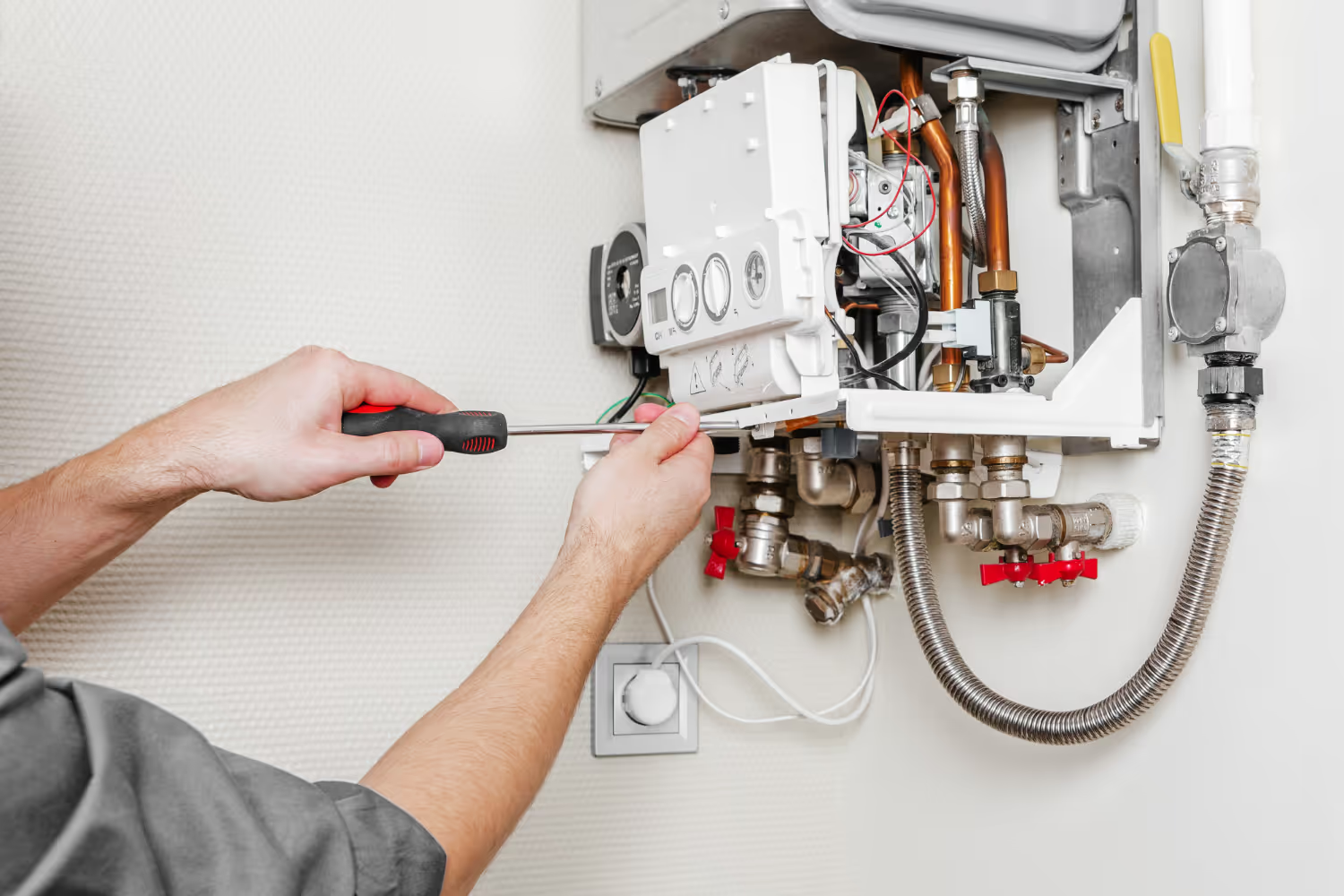


FREE Water Heater
With every whole house repipe purchase. Free brand-new water heater or credit towards a tankless water heater.
.svg)
.svg)
.svg)
.svg)



With every whole house repipe purchase. Free brand-new water heater or credit towards a tankless water heater.
.svg)
.svg)
.svg)
.svg)

Water heaters work hard every day to provide hot water for showers, dishes, and laundry. When they break down, it can disrupt your entire household routine and leave you with cold showers and dirty dishes.
Most water heater problems can be fixed with proper diagnosis and repair, saving you hundreds of dollars compared to full replacement. Common issues like no hot water, strange noises, or leaking tanks often have straightforward solutions that don't require buying a new unit.
Understanding the warning signs and basic troubleshooting steps can help you identify problems early and decide when to call for professional help. In this article, you’ll learn how to diagnose common water heater problems and find effective professional solutions.
Here’s what you need to know:
Keep reading! We'll walk you through the most frequent water heater issues, how to spot them, and what you can do to keep your system running smoothly for years to come.
Most water heater problems stem from three main causes: insufficient tank capacity, internal component failures, or mineral buildup that blocks normal operation.
Understanding why these issues occur helps homeowners identify problems early and take appropriate action.
Tank size mismatch is the most common reason for running out of hot water. A 40-gallon tank cannot support a family of five taking back-to-back showers.
Sediment buildup reduces the actual water capacity in your tank. Minerals from hard water settle at the bottom and take up space that should hold hot water.
Faulty heating elements in electric units prevent water from reaching the right temperature. When the upper or lower element fails, you get less hot water than normal.
Thermostat problems cause the water heater to stop heating before reaching the set temperature. This leaves you with lukewarm water that runs out quickly.
Broken dip tube allows cold water to mix with hot water at the top of the tank. Instead of staying separate, the waters blend and reduce your hot water supply.
Loose connections at inlet and outlet pipes cause small drips that can become major leaks. Temperature changes make metal expand and contract, loosening fittings over time.
Corroded tank walls develop holes from years of exposure to water and minerals. Once the tank itself starts leaking, the entire unit needs replacement.
Faulty temperature and pressure relief valve may leak when it senses unsafe conditions. This valve protects your home but can malfunction and leak continuously.
Worn out drain valve at the bottom of the tank develops leaks from regular use or age. The valve seal degrades and allows water to escape.
Cracked water lines feeding into the unit cause leaks that appear to come from the water heater. Check all connections before assuming the tank itself is leaking.
Sediment accumulation creates a barrier between heating elements and water. The heater must work harder and longer to warm water through this mineral layer.
Undersized unit for your household needs means the water heater runs constantly trying to keep up with demand. It never gets ahead of your hot water usage.
Failing heating elements in electric units lose efficiency over time. They still work but produce less heat, extending the time needed to warm water.
Gas supply issues affect gas water heaters by reducing flame size and heat output. Low gas pressure or dirty burners slow the heating process significantly.
Distance from fixtures means hot water travels farther through pipes, cooling along the way. Long pipe runs require more time to deliver hot water to your taps.
Water heaters give clear warning signs before they fail completely. Knowing when to repair or replace your unit can save you from expensive emergency repairs and cold showers.
Temperature changes are often the first sign of trouble. Your water may come out lukewarm when it should be hot. The temperature might also change while you're using it.
Strange noises from your water heater mean something is wrong. You might hear:
These noises often happen when sediment builds up in the tank.
Water quality issues show your heater needs attention. Rusty or brown water coming from hot water taps means the tank is corroding inside. The water might also smell bad or taste metallic.
Leaks around the unit are serious warning signs. Check for puddles near the base of your water heater. Even small leaks can become big problems quickly.
Higher energy bills without explanation might mean your water heater is working harder than normal. An aging or damaged unit uses more energy to heat the same amount of water.
Age matters most when deciding between repair and replacement. Most water heaters last 8-12 years. If yours is over 10 years old and having problems, replacement is usually better.
According to the U.S. Department of Energy, typical storage (tank) water heaters last 10–15 years, while tankless (on-demand) models usually exceed 20 years, thanks to their durable, replaceable components.
Cost of repairs should guide your choice. If repair costs are more than half the price of a new unit, replacement makes more sense.
Frequency of problems tells us a lot. If you're calling for repairs often, your water heater is probably near the end of its life.
Consider replacement if your unit has:
Minor issues like a bad heating element or thermostat are usually worth fixing.
Complete system failure is the biggest risk. Your water heater could stop working entirely, leaving you without hot water for days.
Water damage from leaks can cost thousands to repair. A failing tank might flood your basement or utility room. This damage often affects flooring, walls, and personal items.
Higher utility bills continue to climb when problems go unfixed. A struggling water heater uses much more energy than a properly working one.
Safety hazards can develop in gas water heaters. Faulty units might not vent properly, creating dangerous conditions in your home.
Emergency repair costs are always higher than planned maintenance. Weekend and holiday service calls cost significantly more than regular appointments.
Most water heater issues can be fixed at home with basic tools and safety steps. Setting the right temperature and regular maintenance help prevent many common problems.
Start by checking if we have any hot water at all. Turn on a hot water tap and wait two minutes.
No hot water:
Not enough hot water:
Strange noises:
Always turn off power or gas before checking internal parts. Look for water puddles around the base. Check the temperature and pressure relief valve for leaks.
We should set our water heater between 120°F and 140°F. The EPA recommends setting water heater thermostats to 120 °F, which reduces heating costs by 6–10%—a simple adjustment that improves both efficiency and safety.
Why 120°F works best:
When to use higher settings:
To adjust temperature, locate the thermostat dial. Turn it slowly and wait 24 hours before testing. Use a thermometer at the tap to check actual temperature.
Higher settings waste energy and can cause burns in seconds.
We should flush our water heater every 6-12 months. Homes with hard water need flushing every 6 months. Areas with soft water can wait 12 months.
Signs you need to flush:
Quick flushing steps:
Regular flushing removes sediment that makes the heater work harder. This extends the tank life and keeps energy costs down. Skip this step and we may need expensive repairs sooner.
Most tank water heaters last 8-12 years while tankless models can run for 15-20 years. Several factors affect how long your unit will work, and knowing when to get professional help can save you money and prevent bigger problems.
Traditional tank water heaters typically last 8-12 years with normal use. These units store heated water in a large tank and are the most common type found in homes.
Tankless water heaters have a much longer lifespan of 15-20 years. They heat water on demand without storing it, which reduces wear on the system.
Electric water heaters usually last slightly longer than gas models. Electric units often reach 10-15 years while gas units average 8-12 years.
Hybrid heat pump water heaters can last 10-15 years. These newer models use heat pump technology to be more efficient.
The age of your water heater matters a lot when deciding whether to repair or replace it. If your unit is over 10 years old and having problems, replacement often makes more sense than expensive repairs.
Water quality has the biggest impact on how long your water heater lasts. Hard water with high mineral content causes more buildup and corrosion inside the tank.
Maintenance schedule directly affects lifespan. Flushing the tank yearly removes sediment that can damage the heating elements and tank walls.
Installation quality matters from day one. Poor installation can cause problems that shorten the unit's life significantly.
Usage patterns affect wear and tear. Homes that use more hot water put more stress on the system and may need replacement sooner.
Location in your home can impact durability. Units in damp basements or areas with temperature swings may not last as long.
Water temperature settings also play a role. Running water too hot can cause more wear on internal parts.
Age-related issues require professional assessment when your water heater hits 8-10 years old. We recommend having it inspected annually after this point.
Frequent repairs signal it's time for expert advice. If you're calling for repairs more than once a year, a professional can help you decide between fixing or replacing.
Performance problems like inconsistent water temperature or taking longer to heat up need professional diagnosis. These issues often indicate internal damage.
Visible leaks around the base or connections require immediate professional attention. Small leaks can quickly become major water damage.
Strange noises like rumbling, popping, or banging sounds mean you should call a technician. These noises often indicate sediment buildup or failing components.
Rising energy bills without increased usage may signal efficiency problems that need professional evaluation.
Water heater repairs can save you money when done correctly. Age, damage type, and repair costs are the main factors we need to consider.
Minor issues like leaks or temperature problems often have simple fixes. These repairs work well for newer units under 8 years old.
Major problems like tank cracks or complete failure usually mean replacement time. We should replace units over 10 years old that break down frequently.
Professional repair services offer several benefits such as expert diagnosis and fixes, safety assurance during repairs, proper tools and equipment, time-saving solutions, and warranty protection.
DIY repairs work for basic issues like replacing heating elements, adjusting temperature settings, fixing minor leaks, and flushing sediment buildup.
We can prevent many problems with regular maintenance. Simple steps like annual flushing and checking connections help avoid costly repairs.
Key warning signs include no hot water production, strange noises during operation, water pooling around the unit, and rusty or discolored water.
Understanding these repair basics helps us make smart decisions. We can identify problems early and choose between fixing or replacing our water heaters.
The right choice depends on our specific situation. We should weigh repair costs against replacement benefits for each case.
Schedule your water heater repair or inspection today with our certified technicians to restore reliable hot water in your home.